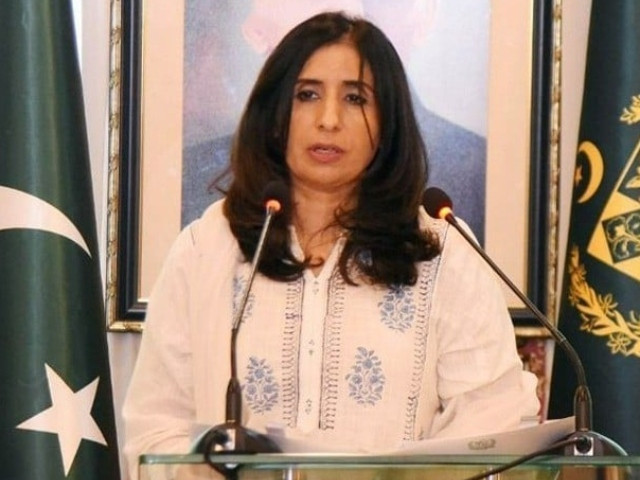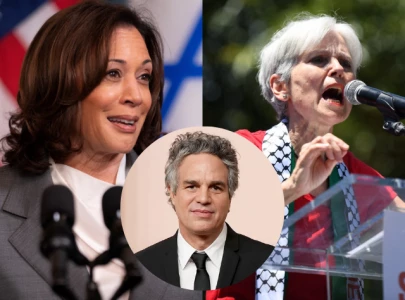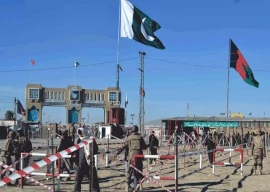
The Foreign Office on Thursday termed the concerns raised during a US Congressional hearing regarding alleged irregularities in the Feb 8 general elections a “misunderstanding of Pakistan's domestic situation and electoral laws”.
“It was an internal debate between the US Congress and the Biden administration. As we said last week, Pakistan values its close relationship with the United States and believes in constructive engagement,” FO spokesperson Mumtaz Zahra Baloch said during her weekly briefing.
“We believe that the deliberations of legislative bodies should contribute to promoting positive dynamics in bilateral ties and should be based on mutual respect and understanding,” she added.
A day earlier, US Assistant Secretary of State for Central and South Asia Donald Lu informed the US Congressional panel that if the Election Commission of Pakistan (ECP) failed to investigate the claims of irregularities in the Feb 8 elections, it would “retard” America’s relationship with Pakistan.
“It will retard our ability to have the type of relationship we want, in security matters, on [the] business front and people to people. All that suffers if Pakistan is not a full democracy,” the diplomat said.
“We have never used the term ‘free and fair’ in characterising these elections,” Lu said while responding to a question from Congressman August Pfluger, a Texas Republican.
Responding to the testimony of Lu before the congressional committee, the FO spokesperson said Pakistan had taken note of the proceedings.
However, she noted during the hearing, some statements were made, which were “intrusive” and “reflected a misunderstanding of Pakistan's domestic situation and electoral laws”.
“We hope to engage in meaningful discussions with the United States to address these misunderstandings. We also hope that the US Congress will play a positive and constructive role in strengthening Pakistan-US ties and developing avenues of mutually beneficial cooperation,” she said.
On the relations with Afghanistan, the FO spokesperson said, channels of communication with Afghanistan remained open and Islamabad was looking forward to working with the de facto government in Kabul to find a solution to the problem.
Tensions between Pakistan and Afghanistan reached new heights earlier this week when Pakistan struck inside Afghanistan on March 18. The rare cross border strikes that hit several terrorist hideouts in Khost and Paktika provinces of Afghanistan was in retaliation to the March 16 terrorist attack in Mir Ali, North Waziristan that left seven Pakistani soldiers martyred.
The Afghan Taliban condemned the strikes as violation of its sovereignty and disputed Pakistani claims that those strikes killed terrorists. But the FO spokesperson at the weekly briefing without providing specific details insisted that the operation was aimed at terrorist hideouts and not the Afghan government or civilians.
“The 18th of March operation was not targeted against the government or institutions or the people of Afghanistan. It was a targeted operation against terrorist hideouts and sanctuaries,” Mumtaz Zahra Baloch told reporters here.
Read: Pakistan shifts stance on Afghan Taliban
“Our position has always been to resolve issues through dialogue. Pakistan has said, including in our statement of the 18th of March, that we respect the sovereignty and territorial integrity of Afghanistan and look forward to working together to find joint solutions in countering terrorism and preventing any terrorist entity from sabotaging bilateral relations between Pakistan and Afghanistan,” she added.
The spokesperson said even prior to the cross border strikes, Pakistan was in touch with the Afghan authorities. She said the Afghan envoy in Islamabad was summoned to record a strong protest after the March 16 Mir Ali attack.
“Yes, after the 16th of March terrorist attack in Pakistan, there was communication between the two countries and a demarche was made with the Afghan authorities conveying our serious concern about the involvement of terrorists from the Gul Bahadur group, which was the prime target of our operation of the 18th of March.”
“The same concern was also conveyed by our Foreign Minister in his telephone conversation with the Interim Afghan Foreign Minister,” she said whilel referring to the maiden telephone contact between Foreign Minister Ishaq Dar and his Afghan counterpart Amir Khan Muttaqi.
To a question, the spokesperson said both sides were still in contact with each other despite recent tensions.
“And yes, the channels of communication between the two countries remain open and our respective embassies are the main channel of communication between Pakistan and Afghanistan,” she maintained.
When asked, the spokesperson said she would not like to delve into operational details.
“We would only like to focus on what we have already shared, that this operation that Pakistan undertook was an intelligence-based operation and it was a targeted operation against terrorists belonging to TTP and the Gul Bahadur group,” she stressed.
“We would not like to glorify any terrorists and list their names. However, as I have said earlier, our focus was the hideout and sanctuaries of the Gul Bahadur group,” she further said.
The spokesperson contested the Afghan government's claims that there were no terrorist hideouts inside Afghanistan. She said Pakistan had on a number of occasions shared its concerns with the Afghan authorities about the presence of terrorist hideouts. The same was endorsed by a UN report, she added.



1730803801-0/BeFunky-collage-(22)1730803801-0-165x106.webp)

1728377970-0/Menendez-Brothers-(1)1728377970-0-165x106.webp)

1730799445-0/Untitled-design-(52)1730799445-0-270x192.webp)
1730800230-0/Copy-of-Untitled-(5)1730800230-0-270x192.webp)










1730706072-0/Copy-of-Untitled-(2)1730706072-0-270x192.webp)
COMMENTS
Comments are moderated and generally will be posted if they are on-topic and not abusive.
For more information, please see our Comments FAQ